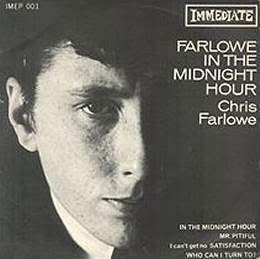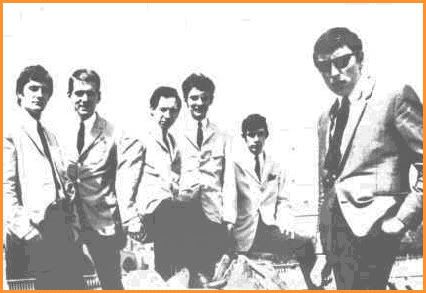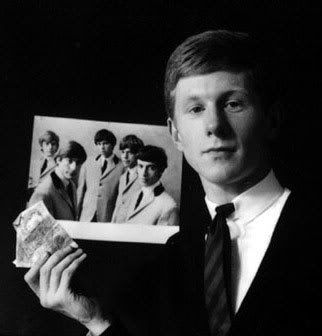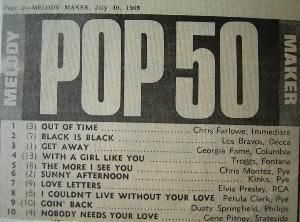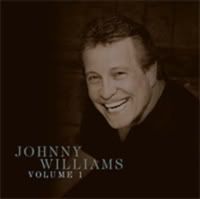 Not all the elements of British r&b were developed within the confines of West London.
Not all the elements of British r&b were developed within the confines of West London.Eric Burdon grew up in Newcastle, a hard-working, coal-mining region that prided itself on the quality of its colliery brass bands. Of course Eric's family did not have any connection with coal-mining as such. Eric did however enjoy listening to dixieland-era jazz which some colliery band trained musicians enjoyed, and in his youth he tried to play some trumpet, which set him apart from many other British r&b musicians of the 1960s, in that he had experience of horn parts. However, like many of his contemporaries, the influence of Chicago blues, and practicality, led Eric sing and to use the harmonica. Not the least of these considerations was that Eric never learnt to play guitar!
During his teens, he happened to pass by a black gospel church in his home town, and was mesmerised by the singing he heard within. Such an experience was exceedingly rare in late 50s and early 60s Britain. There was a growing modernising trend amongst theologians in the Church of England, but it was more aimed towards developing a more rational and scientific response to issues of society. While this appealed to the overwhelmingly areligious population of Britain, who freely admitted to visiting a church only for Christmas, weddings and Christenings, amongst the 10% of regular churchgoers, the traditional service prevailed. For the more evangelical, services were experimenting with personal readings, testimonials, and new hymns based upon British folk music. But an evangelical service in Britain had little in common with the black Baptist church experience in the USA.
Eric's epiphany had been musical and in a way political. He began to seek out the music of Mississippi and Chicago blues. He once explained what had appealed to him so much living far from the American South in a northern British city:
"If I heard John Lee Hooker singing things like, 'I been working in a steel mill trucking steel like a slave all day, I woke up this morning and my baby 's gone away' I related to that directly because that was happening to grown men on my street."
While many members of British r&b bands had benefitted from attending the new art schools, Eric and much of the mod scene had their roots in working-class communities. R&b was not treated as an exercise in historical preservation in Britain, at least at that time. It resonated with their lives on some level.
 Eric and Philip Payne began a band called The Pagans, and performed on the Newcastle clubs. Here Eric encoutered both a kindred spirit and bitter rival in the guise of Alan Price. Over a period of months, the members of the Alan Price Trio, including Bryan 'Chas' Chandler (later to play bass and manage The Jimi Hendrix Experience), would come to merge with Eric's band, to form the Alan Price R&B Combo, also featuring Hilton Valentine of The Wild Cats on guitar. No two members of the original band can agree on exactly who's idea it was, or who joined whose band! All recognised each others talents, while also becoming deeply suspicious of each other's position in the band. On stage, they transmuted their mutual animosities into a raucous performance. Soon they adopted a more appropriate name, The Animals.
Eric and Philip Payne began a band called The Pagans, and performed on the Newcastle clubs. Here Eric encoutered both a kindred spirit and bitter rival in the guise of Alan Price. Over a period of months, the members of the Alan Price Trio, including Bryan 'Chas' Chandler (later to play bass and manage The Jimi Hendrix Experience), would come to merge with Eric's band, to form the Alan Price R&B Combo, also featuring Hilton Valentine of The Wild Cats on guitar. No two members of the original band can agree on exactly who's idea it was, or who joined whose band! All recognised each others talents, while also becoming deeply suspicious of each other's position in the band. On stage, they transmuted their mutual animosities into a raucous performance. Soon they adopted a more appropriate name, The Animals. In the Summer of 1963, The American Folk Blues Festival arrived in London. Amongst the invited performers was the mysterious Sonny Boy Williamson II. The harmonica player Alex 'Rice' Miller, protege of the legendary Robert Johnson, the only one to know the true details of Johnson's death, and who had later adopted the name of the original Sonny Boy Williamson, also a harmonica player, for himself, enjoyed the experience, and was fêted by a number of members of the young r&b scene, amongst them The Yardbirds , the Stones and The Animals. He began to tour the r&b clubs fronting these bands at a series of gigs, some of which were recorded. On December 30th, 1963, Sonny Boy Williamson and the Animals came to the Club A-Go-Go back in Newcastle, and recorded the performance. Recording was overseen by Giorgio Gomelsky. Still, some are not easily impressed:
In the Summer of 1963, The American Folk Blues Festival arrived in London. Amongst the invited performers was the mysterious Sonny Boy Williamson II. The harmonica player Alex 'Rice' Miller, protege of the legendary Robert Johnson, the only one to know the true details of Johnson's death, and who had later adopted the name of the original Sonny Boy Williamson, also a harmonica player, for himself, enjoyed the experience, and was fêted by a number of members of the young r&b scene, amongst them The Yardbirds , the Stones and The Animals. He began to tour the r&b clubs fronting these bands at a series of gigs, some of which were recorded. On December 30th, 1963, Sonny Boy Williamson and the Animals came to the Club A-Go-Go back in Newcastle, and recorded the performance. Recording was overseen by Giorgio Gomelsky. Still, some are not easily impressed:"Truthfully, these live shows are more historically interesting than anything else, being merely passable bar band blues" - Steve Leggett All Music Guide
"Ah, knickers!", as Eric exclaims at the very end of the night, after thanking Sonny Boy and thanking the audience for supporting them. There had never been a passable bar blues band before it in the history of Newcastle! Now, a bunch of eager teenagers and their friends in a northern city were working with and learning from a legendary, experienced Delta bluesman, and it undoubtedly improved both their technique and their confidence. That went for the other groups Sonny Boy jammed with that year. When The Rolling Stones made their assault upon America, they made a point of requesting that Sonny Boy Williamson was also booked to appear alongside them on TV, as a mark of their respect.
Here are some tracks from that recording at the Club A-Go-Go, plus The Animals' own homage to the venue that had nurtured them, which was the b-side to the fantastic Please, Don't Let Me Be Misunderstood.
Sonny Boy Williamson & The Animals - Night Time Is The Right Time (From Charley LP The Animals & Sonny Boy Williamson 1977, recorded December 30th 1963 at Club A-Go-Go Newcastle-upon-Tyne)
Sonny Boy Williamson & The Animals - Bye Bye, Sonny, Bye Bye (from Charley LP The Animals & Sonny Boy Williamson 1977)
The Animals - Club A-Go-Go (b-side of Don't Let Me Be Misunderstood Jan 1965)
Its definitely worth visiting The Animals Official Website , run by original guitarist Hilton Valentine, if you want an introduction to their music. Lots of sound clips are available to sample. Photos of The Pagans are property of Philip Payne, and can be found at This Book Of Burdon by Aimee Harrison. Listen to and buy more clips of the 1963 concert on itunes! Quotes from Steve Leggett at All Music Guide, and from A Change Is Gonna Come by Craig Werner.

